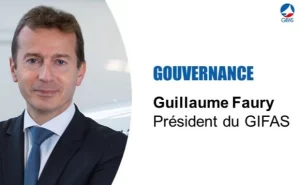By Pierre Tran
Paris – The French aerospace industry was entering 2025 with an “exceptional” geostrategic and political outlook, seeking to respond to strong demand for products and services, while bracing for a gathering storm of U.S. trade tariffs expected from an incoming administration, Guillaume Faury, chairman of Gifas, an aerospace trade association, said Jan. 9.

“There is an accumulation of instability, exceptional uncertainty, and a broad lack of visibility in government guidelines,” Faury told a news conference tied to the French tradition of presenting best wishes for the new year.
Faury is chairman of Groupement des Industries Françaises Aéronautiques et Spatiales (Gifas), and also chief executive of Airbus, the European aerospace company.
There was “geostrategic instability in Ukraine and the Middle East, commercial threat in the space sector from Elon Musk, and American protectionism in a form yet to be defined, but already announced by Donald Trump,” he said.
François Bayrou, a centrist politician recently appointed as prime minister by President Emmanuel Macron, was seeking to persuade a fractured parliament to approve the 2025 budget. The draft 2025 defense budget was due to rise to €50.5 billion from €47.2 billion in 2024, but the divided deputies had yet to approve the bill needed to release the funds.
Trump, the president-elect due to take office Jan. 20, has said the administration would impose a 10 percent tariff on all foreign imports and a 60 percent tariff on Chinese imports, in a bid to narrow the U.S. trade deficit.
French aerospace companies also had to face competition from emerging markets such as China, India, and other nations, which were “stronger and gaining in importance every day,” Faury said. The world was in deep transformation, and while there were strong, clear trends, there was also “a great deal of uncertainty.”
There was a great deal of uncertainty on the expected U.S. “tariff measures,” with lack of clarity on timetable, products, and conditions, he said, in answer to a question. Those expected measures will not lead to a change in the “competitiveness of our products,” he said, but they could lead to “change in the competitiveness of certain geographical zones.”
In terms of industrial investment by European companies, the U.S. had an attractiveness that was “extremely difficult to resist,” he said, citing the case of opening factories for new battery technology. Meanwhile, there was “non-attractiveness” of Europe due to a lack of certainty, he said.
This was not “delocalization,” or shutting down factories, he said, but “localization” of fresh investment, where there was the prospect of greater certainty and higher return on capital.
The 27 European Union member states spent five times less than the U.S. on arms, he said, and Washington spent almost all its military budget on U.S. equipment, outside Europe, he said. The conditions for European economies of scale should be created, he added.
“We need a Europe which sparks confidence, which supports its actors, but also a Europe which supports exports, with national decisions and support from the (member) states,” he said, adding there was a contradiction to manage.
France Won €18 billion in Foreign Arms Orders
Meanwhile, the French armed forces minister, Sébastien Lecornu, said Jan. 7 that France had won in 2024 arms export orders worth “more than €18 billion,” which he said was the second-best year for the nation, with close to €10 billion stemming from foreign orders for the Rafale fighter jet, and attack submarines.
That compared to 2023 export orders of €8.2 billion and 2022 foreign orders of €26.97 billion
The minister was speaking at the formal event of presenting new year wishes to the services, in the main courtyard at Les Invalides.
The new year has started well, he said, with Iraq’s contract signed in September with Airbus Helicopters for 14 Caracal H225M military helicopters going into effect. Two of those helicopters were upgraded second-hand units. Those helicopters would replace the Russian-built Mi-17 helicopters.
The minister said he was looking for another record year in 2025, notably orders for the frigate for defense and intervention (FDI), as well as submarines, radar, artillery, helicopters, and the Rafale fighter.
There would also be particular focus on the SAMP/T new generation surface-to-air missile, he said, which would respond to “ballistic threats from Iran and Russia,” he said.
Dassault Shipped 21 Rafale
On the fighter front, Dassault Aviation reported 2024 delivery of 21 Rafale, up from 13 units shipped in the previous year. The company had previously forecast delivery of 20 of the fighters. Fourteen of the shipments went to France, with seven for export clients, the company said.
The company won 30 orders for the twin-engined jet, all of which were for foreign clients, down from the 60 orders in 2023, of which 42 were for France, and 18 for export.
The 2024 order book stood at 220 Rafale, comprising 164 for export and 56 for France. That compared to 211 units in the order book in the previous year.
The value of those 2024 orders and deliveries will be given March 5, when the 2024 financial results will be reported, the company said.
European Common Procurement
The European Commission approved €300 million ($309 million) of E.U. funding for five cross-border arms projects, seeking to boost coordination in weapons procurement, the Brussels-based executive said Nov. 14.
That E.U. funding represented “a combined procurement value exceeding €11 billion,” the commission said, adding that was the first time the executive had given financial support for common arms procurement.
The funding came from the European defence industry reinforcement through common procurement instrument (EDIRPA), and allocated $60 million toward each of the five projects, bringing a total of €300 million E.U. funding, the commission said.
“EDIRPA’s €300 million investment has incentivized a commitment over 36 times larger, demonstrating the programme’s effectiveness in driving substantial defence investments across the E.U.,” the commission said.
“Bringing greater value for money through economies of scale, the common procurement will make critical defence capabilities more affordable for Member States’ armed forces. With products procured in common, Member States’ armed forces will have improved interoperability,” the commission said.
The procurement consisted of two joint air and missile defense systems comprising the Mistral and Iris-T missiles; a common armored system, namely a troop carrier; and two projects on 155 mm shells, namely common procurement of various types of the artillery ammunition, and high explosive 155 mm shells.
Airbus Shipped 766 Airliners
Airbus, the airliner builder based in Toulouse, southern France, reported in the early evening of Jan. 9 its delivery of 766 passenger aircraft in 2024, up from 735 in the previous year.
The European company, which also has a major plant in Hamburg, Germany, also reported net orders of 826 last year, down from a record 2,094 in 2023.
Airbus has two U.S. plants, with one in Mobile, Alabama for assembly of the A320 line, and a helicopter plant in Columbus, Mississippi, for the UH-72A Lakota light utility helicopter for the U.S. army.
Airbus also has a plant in Tianjin, China, with plans for opening a second assembly line in early 2026.
Airbus is winning in the airliner business, but it is ailing in the space sector, and is in talks with Thales and Leonardo for a cooperation deal. Airbus also needs to find orders for its A400M military airlifter to keep its Spanish assembly line open.
Boeing reported net orders after cancellation of 370 units at the end of November. The U.S. company is due to report 2024 fourth quarter financial results on Jan. 28.
Boeing has been struggling with production problems on its 737 Max airliner, a labor strike, and seeks a Texas court approval on a guilty plea deal on two 737 Max crashes. Families of the 346 victims of those crashes in 2018 and 2019 have filed objection to that plea deal, seeing it as too lenient in view of court sentencing guidelines.
Credit featured graphic: ID 351337003 | 2025 © Paradee Paradee | Dreamstime.com


